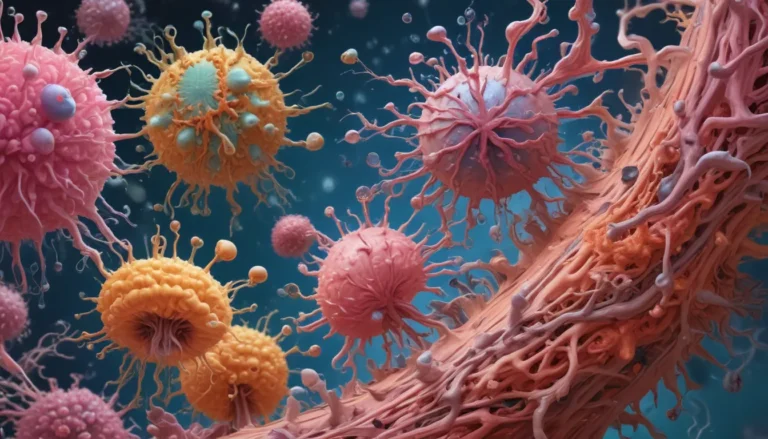A Note About Images: The images used in our articles are for illustration purposes only and may not exactly match the content. They are meant to engage readers, but the text should be relied upon for accurate information.
Are you fascinated by the inner workings of cells and the secrets they hold? Membrane potential, a fundamental concept in biology, plays a crucial role in how cells function and communicate with one another. From nerve impulses to muscle contractions, membrane potential influences a variety of physiological processes. In this article, we will embark on an educational journey to explore 18 fascinating facts about membrane potential, shedding light on the enigmatic world of cellular biology.
Key Takeaways:
- Membrane potential is like a cell’s electric vibe, enabling communication and essential functions within the body. It influences everything from nerve transmission to drug action.
- Changes in membrane potential can impact how cells work and even play a role in diseases, showcasing its significance in cellular health and functionality.
The Basics of Membrane Potential
At the core of cellular communication lies membrane potential, the electrical voltage difference across a cell membrane essential for various physiological processes.
The Role of Ion Channels
Specialized proteins known as ion channels are key players in establishing and maintaining membrane potential by allowing selective movement of ions across the cell membrane.
Cell Communication Through Membrane Potential
Membrane potential serves as the foundation for cell communication, enabling the transmission of electrical signals and coordination of functions within the body.
Nerve Impulses and Membrane Potential
Neurons rely on variations in membrane potential to generate and propagate electrical impulses, facilitating the transmission of signals throughout the nervous system.
Measurements in Millivolts
Techniques like patch clamp and voltage clamp methods are used to measure the electrical potential across the cell membrane, typically in millivolts.
The Resting Membrane Potential
In most cells, the resting membrane potential hovers around -70mV, indicating a slight negative charge inside the cell compared to the external environment.
The Role of the Sodium-Potassium Pump
Maintaining ionic concentration gradients crucial for the resting membrane potential, the sodium-potassium pump ensures the electrical balance within the cell.
Excitability Enabled by Membrane Potential
Changes in membrane potential allow cells, especially excitable cells like neurons and muscle cells, to respond to stimuli and generate electrical impulses.
Exploring Action Potentials
Action potentials are brief, rapid changes in membrane potential triggered by specific stimuli, enabling the transmission of electrical signals along cells.
Membrane Potential and Muscle Contraction
Regulating muscle contractions, membrane potential fluctuations ensure precise control and coordination during movement.
Influence of Signals on Membrane Potential
Various factors like neurotransmitters, hormones, temperature, and pH levels can alter the resting membrane potential, affecting cell excitability and function.
The Role in Ion Transport
Membrane potential is essential for facilitating ion transport across the cell membrane, aiding the movement of crucial ions like sodium, potassium, calcium, and chloride.
Impact on Drug Transport and Action
Certain drugs’ effectiveness and action can be influenced by membrane potential, affecting their ability to interact with cellular targets.
Involvement in Learning and Memory
Changes in membrane potential play a role in learning and memory formation by strengthening or weakening synaptic connections between neurons.
Implications in Diseases
Disruptions in membrane potential are associated with various diseases, including neurological disorders like epilepsy and cardiac arrhythmias.
Voltage-Clamp Experiments
Researchers often use voltage-clamp experiments to manipulate and measure membrane potential, providing valuable insights into cellular electrophysiology.
Influence on Cell Fate
The establishment of specific membrane potentials strongly influences cell fate and specialization by regulating gene expression and development.
Dynamic Nature of Membrane Potential
Highly dynamic and regulated, membrane potential is influenced by various cellular mechanisms and external factors, showcasing its adaptability in cellular processes.
Conclusion
In summary, membrane potential is a cornerstone of cellular function, vital for processes ranging from nerve transmission to muscle contraction and cell signaling. By maintaining a delicate balance of charge across the cell membrane, cells can generate and transmit electrical signals, enabling communication and coordination within the body. The captivating facts about membrane potential explored in this article provide a deeper understanding of cellular biology’s intricacies and the mechanisms that sustain life.
FAQs:
Q: What is membrane potential?
A: Membrane potential refers to the difference in electrical charge across the cell membrane, with the inside of the cell typically negatively charged compared to the outside.
Q: How is membrane potential generated?
A: Membrane potential is generated by the movement of ions across the cell membrane, facilitated by specialized proteins called ion channels.
Q: What is the significance of membrane potential?
A: Membrane potential is essential for cellular processes like nerve conduction, muscle contraction, and cell signaling, enabling the transmission of electrical signals within and between cells.
Q: How is membrane potential maintained?
A: Membrane potential is maintained through the activity of ion channels and ion pumps that regulate ion movement across the cell membrane.
Q: Can membrane potential be altered?
A: Yes, membrane potential can be altered by factors like changes in ion concentrations, the opening and closing of ion channels, and the activity of ion pumps, influencing cellular function and adaptation.
Delving into membrane potential’s fascinating realm unveils the intricate mechanisms cells employ to communicate and function effectively. Expanding our knowledge of cellular biology paves the way for new discoveries and innovations, enriching our understanding of life’s fundamental processes. Join us on this captivating journey as we unravel the mysteries of membrane potential and its crucial role in shaping the world of biology.






